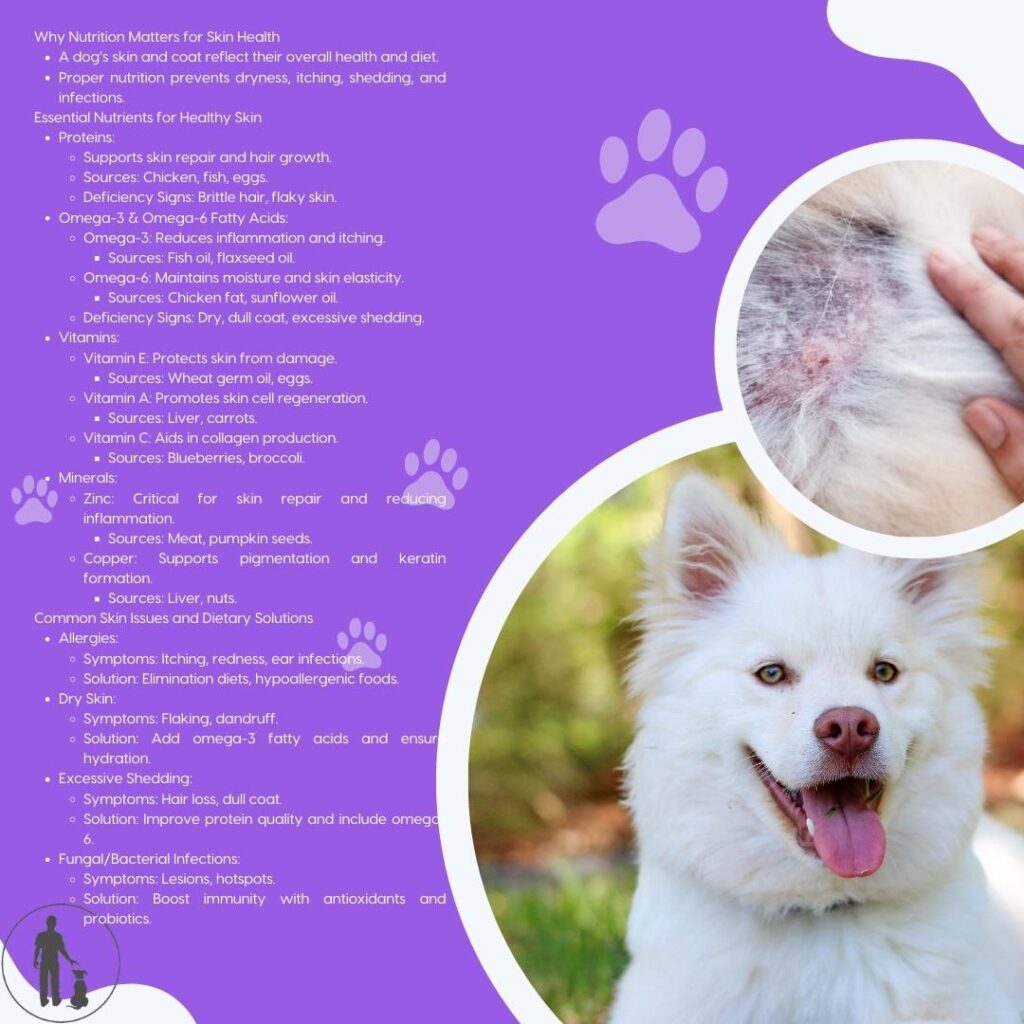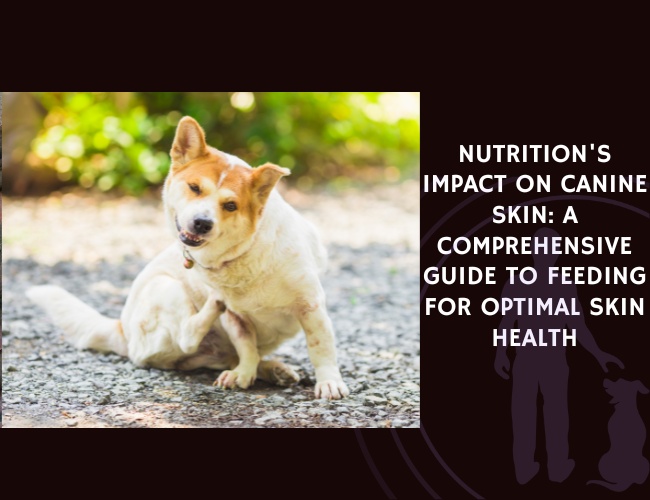Understanding the Skin-Nutrition Connection
The Skin as an Indicator of Overall Canine Health
The skin of a dog serves as an important indicator of its overall health. A dog with healthy, shiny skin and a vibrant coat is often a sign that it is receiving a balanced and nutritious diet. Conversely, dull, flaky, or inflamed skin can indicate underlying health issues or dietary deficiencies. Being the largest organ of the body, the skin acts as a first line of defense against environmental hazards and contributes to the immune response. Observations of changes in a dog’s skin and coat can therefore be vital in diagnosing potential health problems early on.
Role of Proper Nutrition in Maintaining Skin Barrier Function
Proper nutrition plays a crucial role in maintaining the skin’s barrier function. The skin barrier is responsible for protecting the body from pathogens, toxins, and allergens, while also preventing excessive water loss. Essential nutrients like proteins, fatty acids, vitamins, and minerals ensure that this barrier remains intact and functions efficiently.
Proteins provide the building blocks for cellular repair and regeneration. The amino acids derived from dietary proteins are essential for the synthesis of keratin and collagen, both of which are structural components of the skin. High-quality animal proteins such as chicken, fish, and eggs are excellent sources for these amino acids.
Fatty acids, particularly Omega-3 and Omega-6, are indispensable for maintaining skin moisture and reducing inflammation. Omega-3 fatty acids like DHA and EPA help combat inflammatory conditions, while Omega-6 fatty acids like linoleic acid are vital for skin hydration and elasticity. Ensuring a proper balance of these fatty acids in the diet can have a significant impact on a dog’s skin health.
Vitamins and minerals also play supportive roles in maintaining the skin barrier. Vitamin E, for instance, acts as an antioxidant that protects skin cells from oxidative damage. Zinc and copper are essential for wound healing and the maintenance of skin integrity. A deficiency in these nutrients can lead to various skin issues, underscoring the need for a balanced and nutritious diet.
Relationship Between Dietary Intake and Skin Integrity
The overall integrity of a dog’s skin is closely linked to its dietary intake. A balanced diet rich in essential nutrients can enhance the skin’s ability to repair itself, resist infections, and maintain its structural health. Conversely, inadequate or imbalanced nutrition can lead to compromised skin integrity, making it more prone to injuries and infections.
For instance, a diet deficient in proteins can result in brittle hair, flaky skin, and delayed wound healing. Similarly, an insufficient intake of fatty acids can lead to dry, dull skin with excessive shedding. Vitamins A, E, and C, along with minerals like zinc and copper, are crucial for supporting cell regeneration, protecting against oxidative damage, and maintaining overall skin health.
At the same time, an excess intake of certain nutrients can also be detrimental. For example, an overdose of Vitamin A may lead to dry, cracked skin, while excessive fats can cause obesity and related skin issues. Therefore, it’s essential to strike a balance with the guidance of veterinary professionals.
The relationship between diet and skin health extends further to components like hydration and probiotics. Adequate water intake keeps the skin hydrated and supple, preventing dryness and flaking. Probiotics support a healthy gut microbiome, which in turn affects the immune system and skin health positively.
As we delve deeper into the nutritional strategies, understanding this intricate connection helps us tailor a diet that supports optimal skin health in dogs, thus contributing to their overall well-being.
Essential Nutrients for Healthy Skin
Proteins and Their Role in Skin Repair and Keratin Production
Proteins are fundamental components of a canine’s diet, playing a critical role in skin repair and the production of keratin—a key structural protein constituting hair, nails, and the outer layer of skin. High-quality animal proteins, such as those sourced from chicken, fish, and eggs, provide the requisite amino acids necessary for synthesizing keratin and collagen. These proteins fortify the skin’s structural integrity and elasticity, ensuring robust skin barrier function.
Deficiency in proteins can manifest as brittle hair, flaky skin, and delayed wound healing. Regular inclusion of lean proteins can significantly enhance your dog’s skin and coat health.
Omega-3 and Omega-6 Fatty Acids for Inflammation Control and Moisture Retention
Essential fatty acids, particularly Omega-3 and Omega-6, are pivotal for maintaining skin moisture and controlling inflammation. Omega-3 fatty acids, such as DHA and EPA, possess potent anti-inflammatory properties that help alleviate itching and redness associated with skin conditions. These fatty acids can be sourced from fish oil, flaxseed oil, and algae oil.
Omega-6 fatty acids, primarily linoleic acid, are crucial for preserving skin moisture and elasticity. These can be found in chicken fat, sunflower oil, and other vegetable oils. An imbalance or deficiency in these fatty acids often leads to dry, dull coats, excessive shedding, and flaky skin.
Key Vitamins (A, E, C) and Minerals (Zinc, Copper) for Skin Health
Vitamins and minerals play an essential role in maintaining the health and resilience of your dog’s skin.
Vitamins
- Vitamin E: Acts as a potent antioxidant, protecting skin cells from oxidative damage. Sources include wheat germ oil, spinach, and eggs.
- Vitamin A: Essential for cell regeneration and the functioning of sebaceous glands, which help in keeping the skin moisturized. Rich sources are liver, carrots, and sweet potatoes.
- Vitamin C: Aids in collagen production, fostering skin repair. This vitamin can be found in blueberries, broccoli, and in small amounts in citrus fruits.
Minerals
- Zinc: Vital for skin repair and mitigating inflammation. Zinc deficiencies can lead to conditions like alopecia, skin ulcers, and hyperpigmentation. It can be found in meats, whole grains, and pumpkin seeds.
- Copper: Important for pigmentation and keratin production. Sources include liver, nuts, and seeds. Copper deficiency might result in poor coat pigmentation and impaired keratin formation.
A nutritionally balanced diet tailored to meet these specific needs will support optimal skin health and overall well-being for your canine companion. As skin responds visibly to nutritional adequacy, it acts as an excellent indicator for dietary adjustments, ensuring long-term skin and coat vitality.
Can Vitamin Deficiency Cause Skin Problems in Dogs?
Vitamin deficiency can indeed lead to skin problems in dogs, as vitamins play a crucial role in maintaining healthy skin and coat. For instance, a lack of vitamin A can result in poor skin quality, night blindness, and increased susceptibility to infections, manifesting as dull, flaky skin or brittle fur. Similarly, deficiencies in B vitamins, particularly B6 and B12, can affect the immune system and heart health, while also contributing to skin issues like itchiness and dryness. Ensuring that your dog’s diet includes adequate levels of these essential vitamins is vital for preventing such skin-related problems.
Moreover, vitamin D deficiency is another concern that can impact canine skin health. This deficiency may present as allergies, hair loss, skeletal pain, and muscular weakness, all of which can indirectly affect the skin’s condition. Vitamin D plays a role in calcium absorption and bone health, but its influence extends to the skin by supporting overall immune function. Therefore, maintaining a balanced diet rich in necessary vitamins is key to promoting optimal skin health in dogs and preventing potential deficiencies that could lead to skin disorders.
Common Nutrition-Related Skin Issues
Food Allergies and Intolerances
Food allergies and intolerances are common culprits behind various skin issues in dogs. These manifest as itching, redness, ear infections, and hot spots, often leading to significant discomfort for your canine friend. Common allergens include:
- Beef
- Dairy
- Chicken
- Wheat
- Soy
Identifying the specific allergen causing the reaction can be challenging. Implementing an elimination diet, where suspected allergens are removed from the diet and then gradually reintroduced one by one, can help pinpoint the cause. For some dogs, switching to hypoallergenic or novel protein diets can mitigate symptoms and improve skin health. Always consult with a veterinarian before making significant changes to your dog’s diet.
Dry Skin and Coat Problems
Dry skin is a frequent issue associated with nutrient deficiencies, particularly related to essential fatty acids. Omega-3 and Omega-6 fatty acids play critical roles in maintaining skin moisture and reducing inflammation. When a dog’s diet lacks these vital nutrients, it can result in:
- Dry, flaky skin
- Dull coat
- Excessive shedding
Ensuring your dog receives an adequate amount of Omega-3 (DHA, EPA) and Omega-6 (Linoleic Acid) can substantially improve their skin and coat condition. This might involve incorporating fatty fish, flaxseed oil, or supplements into their diet. Additionally, adequate hydration is crucial in preventing skin dryness and maintaining overall skin health.
Immune System-Related Skin Conditions
A well-functioning immune system is essential for maintaining healthy skin. Poor nutrition can weaken the immune system, making your dog more susceptible to skin infections and other related issues. Immune system-related conditions can include:
- Frequent skin infections (bacterial or fungal)
- Hot spots
- Dermatitis
Strengthening the immune system through a balanced diet rich in antioxidants, probiotics, and essential nutrients can help prevent these issues. Foods such as blueberries, broccoli, and small amounts of citrus are excellent sources of antioxidants that support immune health. Probiotics, found in certain yogurts and supplements, can boost gut health, which in turn supports the immune system and improves skin conditions.
Conclusion
Understanding the connection between nutrition and common skin issues is vital for any dog owner striving to maintain their pet’s overall health. By identifying potential allergens, ensuring adequate intake of essential fatty acids, and supporting the immune system through balanced nutrition, you can address and prevent many nutrition-related skin problems in dogs.

Dietary Strategies for Skin Health
Selecting High-Quality Protein Sources and Balanced Nutrition
When considering dietary strategies for skin health, it is important to start with the quality of protein your canine consumes. Proteins play an essential role in skin repair and keratin production, which are crucial for healthy and vibrant skin and coat. High-quality animal-based proteins, such as chicken, fish, and eggs, should be a staple in your dog’s diet. These sources provide the necessary amino acids for synthesizing keratin and collagen, which are vital for skin structure and elasticity.
Balanced nutrition goes beyond just proteins. For optimal skin health, ensure that the diet includes essential fatty acids, vitamins such as A, E, and C, and minerals like zinc and copper. Incorporating these nutrients can help maintain skin integrity, prevent infections, and promote a shiny coat.
Implementing Elimination Diets for Allergy Management
Food allergies and intolerances can significantly impact your dog’s skin health. Common allergens include beef, dairy, chicken, wheat, and soy. Symptoms often manifest as itching, redness, ear infections, and hot spots. One effective way to identify and manage these allergies is by implementing elimination diets.
An elimination diet involves systematically removing common allergens from your dog’s diet and monitoring changes in their skin conditions. Gradually reintroduce each food item while observing for any adverse reactions. This process can help pinpoint specific triggers and aid in creating a hypoallergenic or novel protein diet tailored to your dog’s needs.

Hydration and Probiotic Supplementation Importance
Adequate hydration is essential for maintaining healthy skin as it helps to prevent dryness and flaking. Ensure that your dog has easy access to fresh water at all times. Including moisture-rich foods in their diet, such as watermelons and cucumbers, can also contribute to their overall hydration levels.
Probiotic supplementation is another key aspect of dietary strategies for skin health. Probiotics promote a healthy gut microbiome, which in turn enhances immune responses and skin health. A well-functioning gut can help your dog better absorb nutrients, thus supporting the production of healthy skin cells and reducing the likelihood of skin infections and inflammations.
Conclusion
By selecting high-quality protein sources, implementing elimination diets for allergy management, and ensuring proper hydration and probiotic supplementation, you can significantly improve your dog’s skin health. These strategies lay the foundation for a well-rounded approach to combating common skin issues and promoting overall well-being in your canine companion. Working closely with your veterinarian, you can make informed decisions that will benefit your dog’s skin and coat health, contributing to their overall vitality and happiness.
Supplementation and Support
To maintain optimal skin health for your dog, supplementation can be a valuable addition to their diet. Proper supplementation must be informed by knowledge of essential nutrients and guided by a veterinarian’s advice.
Fish Oil and Other Omega Fatty Acid Supplements
Fish oil is rich in omega-3 fatty acids, specifically eicosapentaenoic acid (EPA) and docosahexaenoic acid (DHA), which have anti-inflammatory properties. These fatty acids help to reduce itching and redness associated with skin conditions. Omega-3 supplements can be derived from fish oil, algae oil, and flaxseed oil.
- Fish Oil: Known for its high EPA and DHA content, fish oil can help reduce inflammation and improve overall skin integrity.
- Algae Oil: A plant-based alternative to fish oil, algae oil provides a source of omega-3 fatty acids without the fishy aftertaste.
- Flaxseed Oil: Another plant-based option, rich in alpha-linolenic acid (ALA), a type of omega-3 that converts to EPA and DHA.
Vitamin E, Zinc, and Biotin Supplementation Benefits
Vitamin E
Vitamin E acts as a potent antioxidant, protecting skin cells from oxidative damage. It can be administered orally or applied topically to moisturize dry skin.
- Sources: Wheat germ oil, spinach, and eggs.
Zinc
Zinc is crucial for skin repair and reducing inflammation. Adequate levels of zinc improve skin integrity and support healing of skin lesions.
- Sources: Meat, whole grains, and pumpkin seeds.
Biotin
Biotin, also known as vitamin B7, supports keratin production, essential for maintaining hair and skin health. It is often included in supplements aimed at improving coat quality.
- Sources: Liver, eggs, and nuts.
Proper Dosing and Veterinary Guidance
The effectiveness and safety of supplements are highly dependent on correct dosing. Over-supplementation can be as harmful as deficiencies. It is essential to consult with a veterinarian before adding any supplements to your dog’s diet.
- Guidelines:
- Omega-3 Supplements: Dosage varies based on the dog’s weight, but generally falls within 75-100mg of combined EPA and DHA per kilogram.
- Vitamin E: Dogs can safely consume vitamin E within a range of 1-3 IU per pound of body weight daily.
- Zinc: Recommended doses vary, with general guidelines suggesting 0.05mg per kilogram of body weight daily.
- Biotin: Safe supplementation ranges from 5-25 micrograms per kilogram of body weight daily.
Correct dosing ensures that your dog receives the full benefit of these nutrients without the risk of toxicity or adverse reactions.
By incorporating targeted supplements such as fish oil, vitamin E, zinc, and biotin into your dog’s diet, you directly support skin health, aiding in inflammation control, moisture retention, and skin repair. Always involve your veterinarian in these decisions to ensure a balanced approach that aligns with your dog’s specific health needs.
Moving forward, continuous monitoring and adjustments will be necessary to support your dog’s evolving dietary and skin health needs.
Monitoring and Maintenance
Monitoring and maintaining your dog’s skin health requires a proactive and vigilant approach. Ensuring that dietary changes and supplementation are effective involves regularly assessing your dog’s skin and coat condition, working closely with veterinarians for nutritional adjustments, and tracking progress. This chapter will guide you through these essential steps.
Regular Assessment of Skin and Coat Condition
Keeping a close eye on your dog’s skin and coat condition is the first step in monitoring their health. Regular assessments help identify any issues early and determine the effectiveness of dietary changes.
- Visual Inspection: Look for signs of healthy skin, such as even pigmentation, smooth texture, and absence of lesions or inflammation. A shiny coat with minimal shedding indicates good health.
- Physical Examination: Gently run your hands over your dog’s body to feel for lumps, bumps, or rough patches. Check areas that are prone to issues, like under the arms and between the toes.
- Behavioral Observation: Pay attention to your dog’s behavior. Excessive scratching, licking, or biting can indicate underlying skin problems.
Regular checks should be done at least once a week to catch any changes early.
Working with Veterinarians for Dietary Adjustments
Veterinarians play a crucial role in managing your dog’s nutrition and overall health. Collaborate with your vet to ensure that your dog’s diet supports optimal skin health.
- Nutritional Assessments: Vets can perform comprehensive nutritional assessments to evaluate your dog’s current diet, identifying deficiencies or excesses.
- Dietary Recommendations: Based on the assessment, your vet can recommend necessary dietary adjustments, including additional supplements or changes in protein sources.
- Allergy Management: If food allergies are suspected, your vet can guide you through an elimination diet to identify and manage specific triggers.
Regular vet visits ensure that your dog’s dietary needs are met and adjustments are made based on their evolving health status.
Tracking Improvement After Dietary Changes
Tracking progress is vital to determine the success of dietary changes in improving your dog’s skin health. Here are some methods to effectively monitor improvements:
- Photographic Records: Take before-and-after pictures of your dog’s skin and coat. This visual comparison can vividly show the effects of dietary adjustments.
- Journaling: Keep a weekly journal documenting your dog’s skin condition, noting any changes in texture, appearance, and behavior. Include details of their diet, supplements, and any incidents of itching or discomfort.
- Periodic Vet Check-Ups: Schedule regular visits to the vet for professional assessments. Vets can provide objective insights into your dog’s progress and adjust recommendations accordingly.
By maintaining records and working closely with your vet, you can make informed decisions about your dog’s nutritional plan, ensuring sustained skin health and overall well-being.
Remember, maintaining your dog’s skin health is an ongoing process that requires diligence and collaboration with veterinary professionals. Regular monitoring, informed dietary decisions, and professional guidance will keep your dog’s skin and coat in optimal condition.










